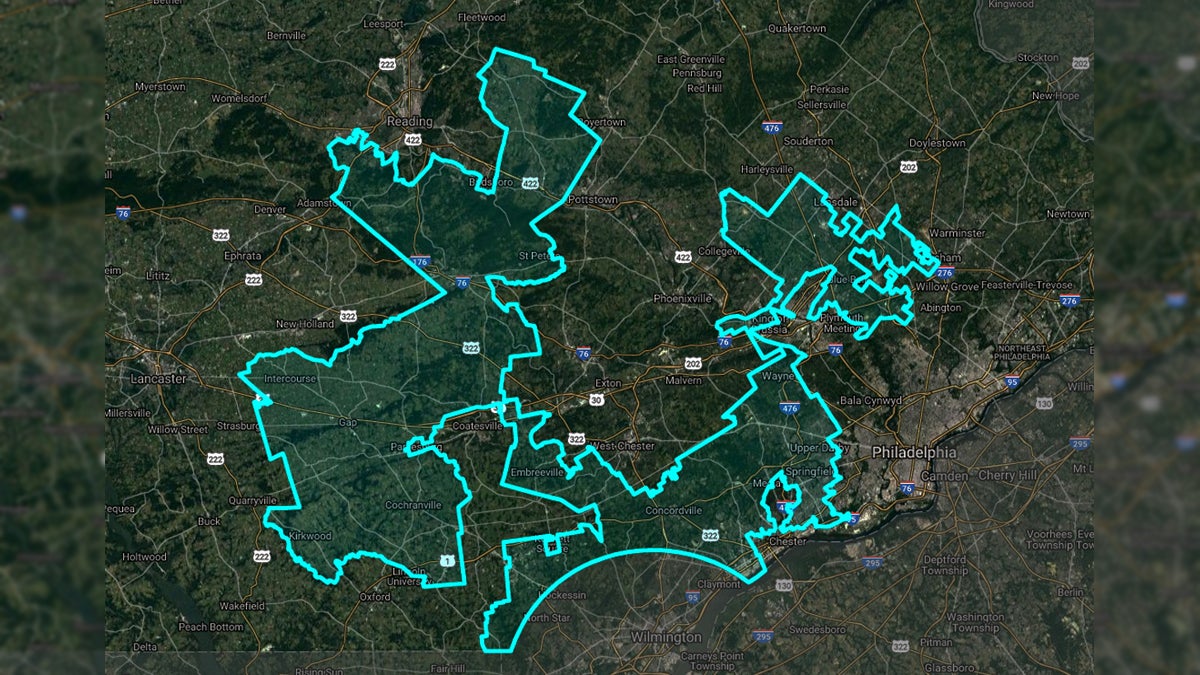Could Wisconsin gerrymandering decision affect Pa.?
Listen
Pennsylvania’s 7th Congressional District is often considered the poster child of gerrymandering. The district cuts through five counties and a number of municipalities including Chester
In a potentially groundbreaking ruling, a three-judge federal court panel has struck down Wisconsin’s legislative district boundaries, saying they’re so gerrymandered they violate the equal protection clause of the Constitution.
Could Pennsylvania be next?
As it happens, the analysis used to persuade the judges the Wisconsin districts are unfair has also been applied to Pennsylvania’s districts, and it shows the state might also be ripe for a challenge.
For decades, judges have been reluctant to scrap legislative boundaries based on partisan impact, partly because the courts say it’s an inherently political process, but also because it’s hard to find an objective measure of gerrymandering.
In the Wisconsin case, the nonprofit Campaign Legal Center developed an analytical method to measure how effective each party’s voters are in a given legislative map.
Ruth Greenwood, the center’s deputy director for redistricting, said that in Wisconsin, Democrats were packed into a few urban districts while Republicans were sprinkled around so they had just enough to win lots of districts.
“So the Republicans will win all of the close districts, and the Democrats will win districts by an overwhelming majority,” she said. “So if you go through it, you see it’s a really inefficient distribution of Democratic voters, but a very efficient distribution of Republican voters.”
It’s a little complicated, but the center developed an index for each legislative map, called its “efficiency gap.”
The method comes from a University of Chicago law professor, Nicholas Stephanopoulos, and Eric McGhee, a research fellow at the Public Policy Institute of California.
They applied the analysis to nearly every state house election for the last 50 years and found the current Pennsylvania map so gerrymandered that Republicans will control the House even in a year when Democrats do well statewide.
“That’s the hallmark of a Republican gerrymander,” Greenwood said. “It doesn’t matter if the vote swings one way or the other, you keep getting one side elected and having control of that chamber.”
Greenwood said there’s been plenty of gerrymandering over the years by both parties. The Democrats tended to dominate in the ’70s and ’80s, while the Republicans have had the upper hand more recently.
In Pennsylvania, redistricting is controlled primarily by legislative leaders. They appoint four of the five members of the commission that draws boundaries for the state Legislature. Congressional districts are done by the Legislature, like any other bill.
I called the Republican legislative leadership, and Senate Majority Leader Jake Corman called me back.
He said the Democrats’ problem isn’t gerrymandering, it’s demographics.
“The seats they have are overwhelmingly Democratic, but there’s not much you can do about it, because in Philadelphia there’s only Democrats,” he said. “Where the seats that are more swing seats, the Republicans are winning.”
He also said Republicans are winning legislative seats because they run good candidates.
There’s currently no challenge to Pennsylvania’s district map, though Greenwood told me she’s gotten some calls from the state asking about the idea.
Meanwhile, the group Fair Districts PA wants to take redistricting out of the hands of legislative leaders.
“We are working to try to achieve a nonpartisan commission, which is composed of people who are not politicians or lobbyists or party operatives,” said Barry Kauffman of Common Cause Pennsylvania, a participant in the group.
Republicans say an appointed commission might be just as political, and, unlike elected lawmakers, a commission would not be accountable to voters. Evidence developed in the Wisconsin case showed leaders drew lines with overtly partisan intentions.
The Fair Districts PA effort to change the state Constitution hasn’t made much headway in the Legislature. Its members hope the effort will get new attention and energy from the Wisconsin decision.
The Wisconsin case is likely to go to the U.S. Supreme Court.
WHYY is your source for fact-based, in-depth journalism and information. As a nonprofit organization, we rely on financial support from readers like you. Please give today.


